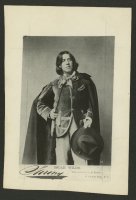 Saint Tikhon (born Vasily Ivanovich Bellavin) was born in the village of Klin in the Toropets district of Pskov province, into the family of a priest who was soon transferred to the district town after the birth of his son. From an early age, his father took him to church services, and this love for the temple became an inseparable part of his life.
Saint Tikhon (born Vasily Ivanovich Bellavin) was born in the village of Klin in the Toropets district of Pskov province, into the family of a priest who was soon transferred to the district town after the birth of his son. From an early age, his father took him to church services, and this love for the temple became an inseparable part of his life.
 On October 15, 2024, the European Foundation for Slavic Literature and Culture conducted an open online lesson dedicated to the life and works of Mikhail Yuryevich Lermontov. The lesson aimed to deepen knowledge of the poet's biography, examine his fate and works, and analyze how his life experiences are reflected in his literature.
On October 15, 2024, the European Foundation for Slavic Literature and Culture conducted an open online lesson dedicated to the life and works of Mikhail Yuryevich Lermontov. The lesson aimed to deepen knowledge of the poet's biography, examine his fate and works, and analyze how his life experiences are reflected in his literature.






